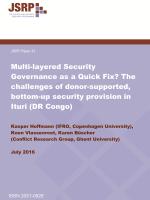Political solutions needed to improve security in the Congo
International actors have been trying to improve the security of Congolese citizens for almost two decades. Donors have spent vast resources on security sector reform, demobilization programmes and on forging peace deals between warring parties. The UN also has a large peacekeeping force in the Congo, with a clear mandate to protect the civilian population. Yet, insecurity still marks the life of many Congolese. This has prompted some international donors to seek new ways to improve security provision for Congolese citizens. One of the ways in which they are doing this is to support local non-state security actors. Often these actors consist of local authorities, such as customary chiefs, village elders, or business people working in collaboration with different kinds of self-defence groups. The idea behind this kind of ‘multi-layered’ security governance is that the inclusion of local non-state actors in security governance will improve security provision to people because they are part of the community and have more legitimacy.
Based on fieldwork in the restive Ituri province in eastern DR Congo, the working paper argues that while such bottom-up approaches can be effective under the rights conditions, it should not be seen as the solution to the complex security problems people are faced with in areas of chronic conflict, poverty and instability.
International support to non-state security actors represents an intervention with both political and economic repercussions, which may upset the existing order – for good or bad. External actors therefore should be aware that support to non-state security actors could create further competition in the security sector.
The working paper suggests that attempts to improve security for Congolese citizens should include a coherent and long-term strategy aiming at addressing the underlying causes of insecurity. This strategy should be based on in-depth knowledge of the socio-political context within which it is to be implemented to identify the factors generating insecurity and how they interact with each other. If these factors are identified, international actors can begin to make coherent strategies to deal with them. Such a strategy might benefit from the incorporation of non-state security actors, but they do not necessarily offer a solution, since empowering them represents a political option that can create friction with state authorities and other non-state security actors. Political solutions must be found to the underlying conflicts, which generate insecurity. In the absence of political solutions, the effectiveness of attempts to improve security conditions by external actors will be severely limited.

